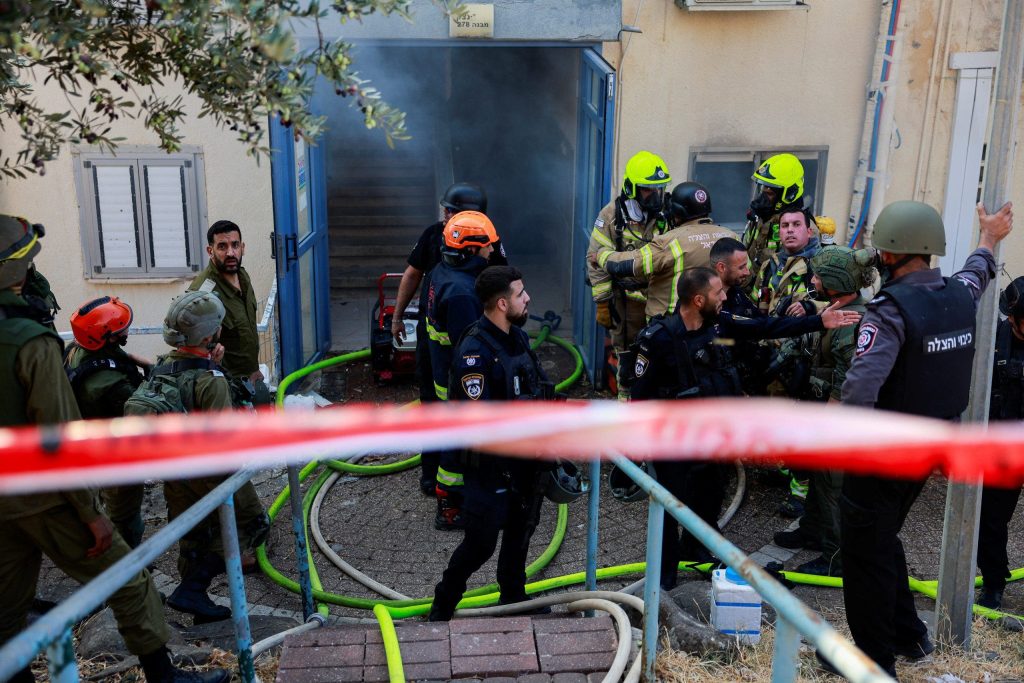Israel experienced a terror attack in which a knife-wielding motorist in the city of Hadera injured eight people. Simultaneously, rockets landed in a city in Israel’s northeastern region, causing the deaths of two individuals. The Minister of Defense of Israel canceled a visit to the Pentagon amid the escalating conflict in the Middle East. The suspect in the attack was eventually subdued by armed residents before police arrived on the scene. The suspect was identified as an Israeli-Arab man from Umm el-Fahm, known to police for prior criminal activities. The attacks took place as Israel faced conflicts with Hamas in the south and Hezbollah in the north.
The victims injured in the attack in Hadera were being treated at the Hillel Yaffe Medical Center, with one individual in critical condition and another in grave condition. Four victims were described as in moderate condition, one as lightly injured, and an eighth individual was hospitalized for anxiety. The suspect was shot and wounded by residents before being apprehended by the police. The attacks have raised concerns among Israeli authorities about potential retaliatory actions against Iran following its missile strike. President Biden and Prime Minister Netanyahu discussed Israel’s planned response and the importance of maintaining a proportionate reaction to the escalating violence.
The escalating conflicts have strained relations between Israel and the United States, with the Biden administration expressing frustration over Israel’s actions and withholding of security details. There have been warnings against launching an incursion into Lebanon against Hezbollah, which could trigger a broader regional war. The White House has urged Israel to avoid targeting Iranian nuclear or oil facilities and to keep their responses proportionate, although specifics have not been provided. The attacks in Israel have highlighted the ongoing tensions in the region and the complexity of managing multiple conflicts simultaneously.
The involvement of armed residents in subduing the suspect in the Hadera attack underscores the volatile situation in Israel and the potential for vigilante justice amid escalating violence. The attacks also serve as a reminder of the persistent threat of terrorism in the region and the importance of maintaining security measures to prevent further incidents. The coordination between Israeli and American leaders in responding to the attacks highlights the close relationship between the two countries and the need for cooperation in addressing regional security challenges. The attacks in Israel have further complicated an already fragile situation and raised concerns about the potential for further violence in the region.
The injuries sustained by the victims in the Hadera attack underscore the human cost of the ongoing conflicts and the need for swift and effective responses to ensure the safety of civilians. The attacks have caused widespread fear and uncertainty among the population, with concerns about the potential for further violence and the ability of authorities to maintain security. The attacks also highlight the complex geopolitical dynamics at play in the region, with multiple actors vying for influence and power. The international community must work together to support efforts to de-escalate tensions and prevent further violence in the region.
In conclusion, the recent attacks in Israel demonstrate the precarious security situation in the region and the challenges facing authorities in maintaining stability amid escalating conflicts. The involvement of armed residents in subduing the suspect highlights the need for vigilant security measures to prevent further attacks. The close coordination between Israeli and American leaders in responding to the attacks underscores the importance of international cooperation in addressing regional security challenges. The attacks serve as a grim reminder of the ongoing threat of terrorism in the region and the need for continued efforts to promote peace and stability.















